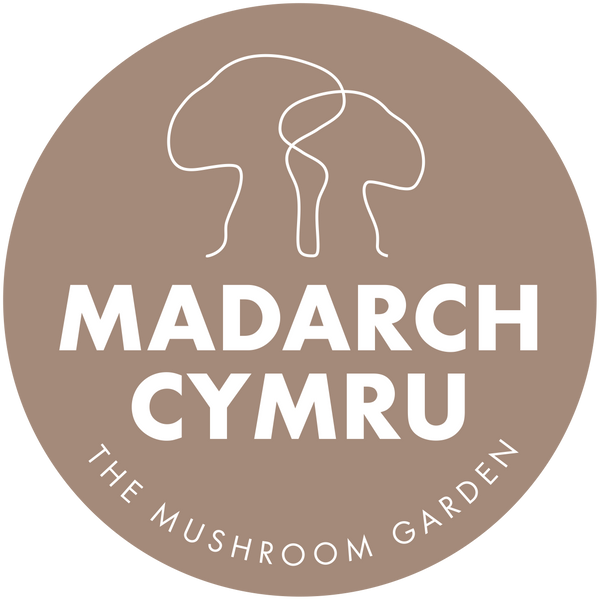
The Power of Mushrooms
Share
Health benefits and community growing in Wales
Can growing mushrooms make communities happier, healthier, and wealthier?
With three community mushroom-growing units across West Wales, in the form of bespoke-adapted shipping containers, Tŷ Cynan is growing Lion’s Mane, Shiitake, and Wood Oyster mushrooms.
While each of these mushrooms offers unique health benefits, nutrition and distinct flavours, the overall business offers direct community benefits - by providing opportunities for skill development, employment, and social engagement, all of which contribute to a stronger, healthier society.
The health benefits of mushrooms
Lion’s Mane: A brain-boosting powerhouse
Lion’s Mane mushrooms (Hericium erinaceus) having recently gained widespread attention
worldwide, often featured in teas and supplements for their potential cognitive benefits.
These striking, fluffy white mushrooms contain bioactive compounds such as hericenones
and erinacines, which can pass through the blood-brain barrier and stimulate the production of nerve growth factor (NGF). NGF plays a vital role in protecting neurons, potentially improving memory, learning, and overall brain function (while not a traditional adaptogen, Lion’s Mane shares some adaptogenic qualities, especially in how it supports the brain’s resilience to stress and age-related decline).

A 2020 study involving 49 participants aged 50 and above, found that those who consumed Lion’s Mane supplements (1 gram) over nearly a year showed significant improvements in cognitive assessments compared to a control group. This study is part of a growing body of research exploring Lion’s Mane’s effects on health. Other studies, both in animals and humans, have also reported benefits, though more large-scale, long-term clinical trials are needed to fully understand its potential and long-term benefits. Additionally, while supplementation is popular, consuming whole fresh and dried Lion’s Mane mushrooms as part of a balanced diet offers a natural way to enjoy them.
Shiitake: Supporting Immune Health and Vitality
Shiitake mushrooms (Lentinula edodes) are well-known for their deep umami flavour.
Umami is the fifth basic taste, often described as savoury or meaty. Shiitake mushrooms are naturally rich in umami due to their high levels of glutamates and guanylate, which give them their distinctive depth of flavour They also have an impressive nutritional profile, rich in potassium, magnesium, iron, phosphorus, and essential B vitamins, these mushrooms support energy production and nervous system function.

Scientific studies indicate that Shiitake mushrooms can enhance immune function. One peer reviewed 2015 study involving 52 adults found that consuming 5 - 10 grams (between 1 and 2 teaspoons) of Shiitake daily for four weeks led to improved immune function and reduced inflammation. While these findings highlight Shiitake’s potential in immune support, and additional studies have reported similar immune-modulating effects, further research is still needed to determine long-term outcomes and explore its broader health benefits
Wood Oyster Mushrooms: A Sustainable Superfood
Wood Oyster mushrooms (Pleurotus ostreatus), commonly found growing on decaying
wood, are packed with antioxidants, dietary fibre, and protein. These mushrooms are known for their ability to support heart health by reducing cholesterol levels, due to their natural statin compounds, such as lovastatin. Additionally, their anti-inflammatory properties may aid digestion and support gut health.
These three mushrooms grow quickly and are resilient, making them an excellent option for community farming initiatives.

Community growing: Strengthening local economies and wellbeing
How mushroom farming benefits local communities
Community mushroom-growing projects, such as those led by Tŷ Cynan, offer numerous
advantages beyond food production, including:
- Improving Mental Wellbeing – Engaging in community farming provides social
connection and a sense of purpose. Gardening and growing food have been linked to reduced stress and improved mental health. - Creating Local Economic Opportunities – Small-scale mushroom farms can
supply fresh, high-quality produce to local markets, restaurants, and food
cooperatives. By supporting local businesses, these initiatives help keep money
circulating within the community, fostering economic resilience. - Encouraging Sustainable Food Production – Mushrooms are a low-impact crop
that can be cultivated using recycled materials such as coffee grounds and sawdust.
This makes them an excellent choice for sustainable agriculture, reducing food miles
and dependence on large-scale commercial farming. - Enhancing Food Security – By growing mushrooms locally, communities gain
access to fresh, nutritious food while reducing reliance on imported goods. This
contributes to greater food sovereignty and resilience against supply chain
disruptions.
Looking ahead: The future of community mushroom farming in Wales
The success of Tŷ Cynan’s mushroom-growing initiatives highlights the potential for similar
projects across Wales. As awareness of the health benefits of mushrooms grows, so too
does interest in community-driven agriculture. By investing in sustainable, locally focused
food production, communities can enhance their wellbeing while building stronger local
economies.
From Lion’s Mane for brain health to Shiitake’s immune-boosting benefits and the eco-
friendly strength of Wood Oyster mushrooms, these fungi are showing they're much more than just tasty ingredients—they’re natural powerhouses for health and sustainability.
By supporting local mushroom-growing initiatives, we are not only nourishing our bodies but also contributing to resilient communities and a more sustainable, prosperous future - aligning with the Well-being of Future Generations Act’s vision for a healthier, happier, and more equitable Wales.
